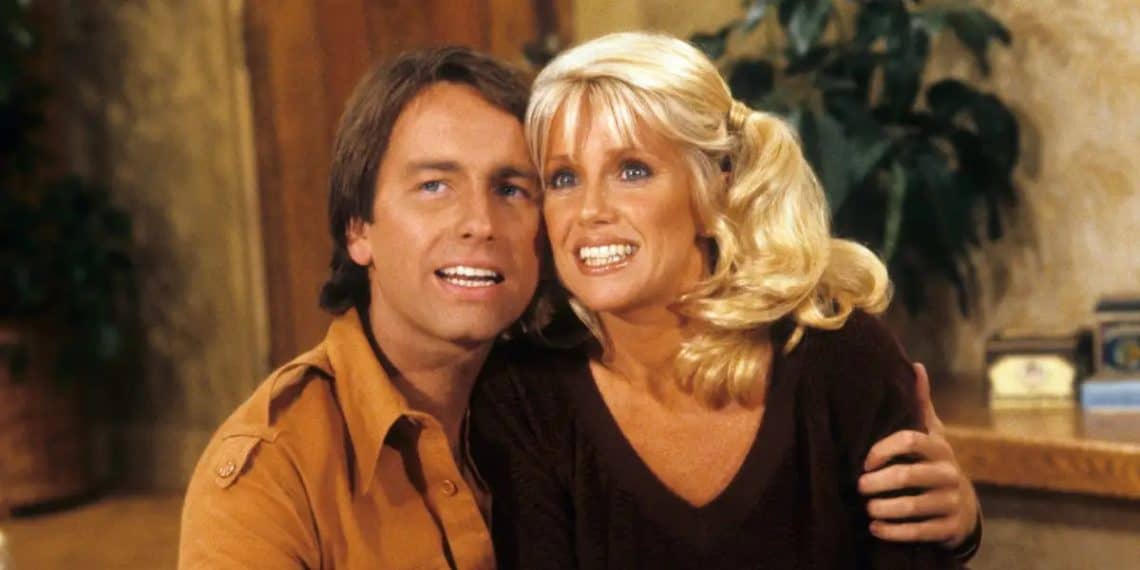Breast cancer tormented Suzanne Somers for a grueling 23-year battle. Just a few days short of turning 77, she died quietly at 76. The actress received admiration for her timeless looks and dedication to maintaining a healthy lifestyle throughout her life.
On “Three’s Company,” we will dive further into Suzanne Somers’ contentious background. Because of how other people responded to the actress’s request for a raise at the height of the show, it took the actress a while to rebuild her connections.
We’ll look at Somers’ trailblazing request for higher pay, talk about its effects on her leaving the program, and also throw some insight into her husband’s feelings at the time of her exit.
Suzanne Somers and Three’s Company
From 1976 through 1984, “Three’s Company” enjoyed an amazing run that spanned eight fruitful seasons. Jack Tripper, played by John Ritter, served as the show’s main protagonist.
Nevertheless, Suzanne Somers, who played the part of Chrissy Snow, contributed much to the production. Somers requested a significant pay increase, going from $30,000 to $150,000 per episode, since she felt she deserved to be paid equally to Ritter.
Somers eventually left the show due to her request for a wage hike. The late Somers admitted to People that she had never intended to leave the show. She said she likely would have continued working on network series and appeared in many more sitcoms if things had turned out differently.

She left the show, though, because of how her exit played out, which made her feel isolated. It was difficult for Somers to leave the program, and her husband Alan Hamel, a former TV producer, thought ABC let her go to send a message to other women who were at the time asking for equal pay to male leads. This action was viewed as a means of discouraging other women from asking for better pay.
Husband Alan Hamel supported Suzanne Somers
There has recently been progress in gender equality in Hollywood, but work still needs to be done. Reese Witherspoon and Jennifer Aniston are two women who are notable for being among the highest-paid actors in television.
The “Friends” cast also made sure that all six main cast members, including the three female co-stars, received equal pay, which significantly contributed to the advancement of equality. It was a good step forward that David Schwimmer, in particular, insisted on equal compensation for the entire group.
The attempt of Suzanne Somers to start a new trend in Hollywood did not go well. Her husband claims that the network’s decision to fire her was made strategically to deter other female stars from making similar talks in the future. Her attempt to bargain for a higher salary was denied.
Alan Hamel claims that the decision to terminate Suzanne Somers was made following the completion of the contract negotiations for the television program “Laverne & Shirley.” By letting her go, the network hoped to prevent other female stars from demanding salaries comparable to those of male actors.
Suzanne Somers was treated differently after her departure
Suzanne Somers and Joyce DeWitt, her co-star in “Three’s Company,” could not get back together for three decades. The entire cast had opposed Somers because they thought she was asking for too much money at the time, which was the basis for the protracted split.
“It was a very disheartening experience,” Suzanne Somers said. It resembled being shunned by your own family. When the producers went back to the rehearsal hall, they told the cast something that gave the impression that I was a stingy person trying to ruin the play. As a result, the entire cast and crew avoided me, and I never spoke to anyone from that show again.
Joyce DeWitt emphasized that Somers and she had a falling out because of their divergent views on acting. DeWitt handled acting with a more personal touch, viewing the group as a close-knit family, in contrast to Somers, who saw performing as a business.


